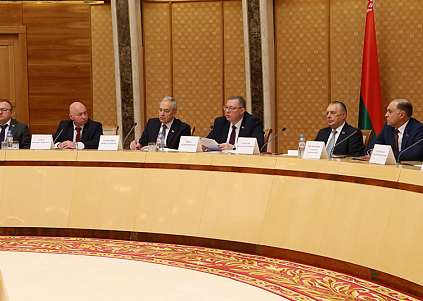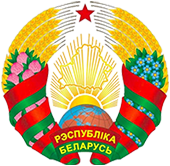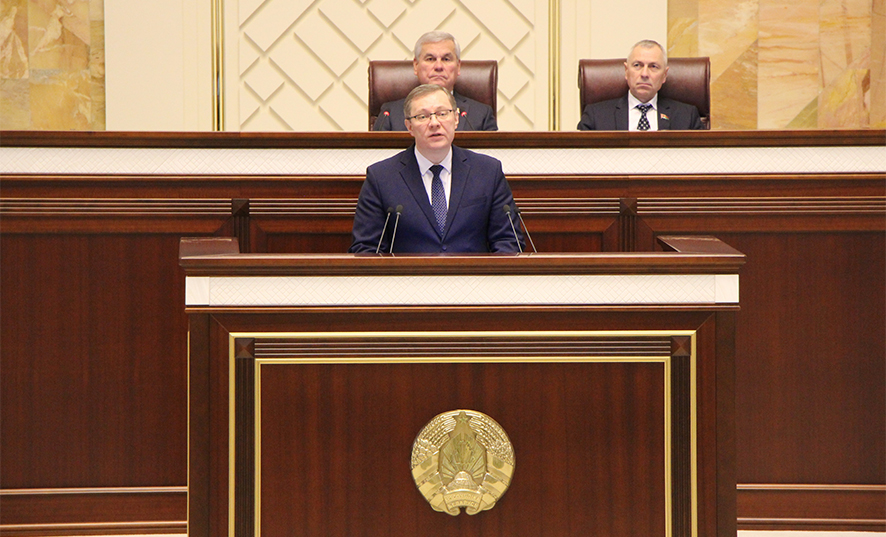The Prosecutor General of the Republic of Belarus Andrei Shved made a presentation in the House of Representatives of the National Assembly of the Republic of Belarus on the draft Law “On Amendments to the Laws on the Fight against Corruption” (hereinafter referred to as the draft Law).
For reference. Taking into account the analysis of law enforcement practice and foreign experience, in 2019 the Prosecutor General’s Office initiated amendments and additions to the Law of the Republic of Belarus of July 15, 2015 No. 305-З “On the Fight against Corruption” (hereinafter referred to as the Law).
In accordance with the instructions of the Head of State, the Prosecutor General’s Office together with the Supreme Court and other authorities concerned, has done a lot of analytical work, which made it possible to prepare amendments and additions to update the Law.
“In the Republic of Belarus, corruption is viewed as one of threats to national security. Countering this phenomenon is the primary task of state bodies and organizations and one of the most important priorities of domestic policy. The practice of prosecutorial supervision testifies to the fact that corruption is most widespread in industry, agriculture, trade, construction, as well as in the sphere of public administration,” said Andrei Shved.
The Prosecutor General stressed that prevention of crimes against the interests of service, along with their detection and suppression, is important.
For reference. The Law on the Fight against Corruption, adopted in 2015, contains mechanisms designed to minimize the attractiveness of acts of corruption.
For example, the right to pension maintenance for civil servants and military personnel who committed grave and especially grave crimes with the use of official powers is limited. A prohibition to recruit persons who had committed corruption offenses was introduced. Accountability of a number of officials holding a responsible office was strengthened.
Amnesty, parole and replacement of the unserved part of the sentence with a more lenient one are not applied to those convicted of corruption.
Provisions on liability of legal entities for corruption were introduced in the Code of the Republic of Belarus on Administrative Offenses.
The amendments and additions proposed to the draft Law are not related to adjustment of conceptual provisions of anti-corruption legislation, but are aimed at improving preventive anti-corruption mechanisms, optimizing interaction in the anti-corruption sphere.
Appeals received by the Prosecutor General’s Office indicate that there are difficulties in classifying employees as state officials. This is due to the absence in the Law of definitions for organizational and management and administrative and economic duties, which creates difficulties in the interpretation and application of anti-corruption provisions.
As a result, it was proposed to supplement Article 1 of the Law with definitions of these terms. Andrei Shved informed the meeting participants about the need to improve regulation of the institution of preventing and resolving conflicts of interest – one of the most promising anti-corruption mechanisms.
It was proposed to establish a disciplinary responsibility up to dismissal for all categories of public officials for its non-observance.
An initiative has been developed concerning an additional form of interaction, which will allow an organization to receive information from law enforcement agencies about corruption acts of its employees. The obligation of an organization to provide information about the facts of corruption among its employees to law enforcement agencies has been preserved (Article 10 of the Law).
The draft Law made a proposal to mend certain anti-corruption restrictions established in Article 17 of the Law.

For example, it was additionally proposed to include spouses of children in the list of close persons of a public official, – this initiative was motivated by cases of corruption in the interests of a son-in-law and daughter-in-law of a public official. Attention is paid to the issue of implementation of anti-corruption restriction on receipt of property (gifts).
The problem is related to the lack of definitions in the legislation of the concepts of “souvenir”, “protocol event”, “other official event” and their evaluative nature. In this connection definitions of the named terms were introduced.
Among other changes, the draft Law provides for a prohibition for a public official to use for personal and other non-official interests any property of a state body, organization, and not only that received by him/her in the performance of official (labor) duties.
At the same time, it was proposed to establish responsibility for the use of property of business entities for personal purposes, regardless of the state’s share in their statutory fund.
The restriction on simultaneous service (work) in government bodies and organizations of spouses, close relatives or in-laws was mended.
Taking into account the results of the analysis of the practice of prosecutorial supervision and the proposals of government agencies concerned, a number of amendments to Chapter 4 of the Law have been prepared. They are aimed at eliminating excessive requirements to declaration procedure, as well as increasing the effectiveness of this preventive mechanism.
The law will be supplemented by a provision (Article 27-1) which establishes a list of income and property that are not subject to mandatory declaration. These include income received from participation in various bonus programs offered by banks, trade and service organizations, as well as property of insignificant value received as gifts.
It is proposed to detail the responsibilities of the heads of state bodies and other organizations in the field of combating corruption.
For reference. The obligation of superiors to take anti-corruption measures within their competence, established by Article 43 of the Law, is complemented by obligations to prevent and identify violations of anti-corruption legislation, eliminate the consequences resulting from such violations, the reasons and conditions that contribute to them.

“We believe that the proposed measures will increase the preventive component in the fight against corruption, will contribute to the prevention of corruption offenses and crimes,” summed up Andrei Shved.
At the end of his speech, the Prosecutor General answered questions from parliamentarians.
For example, one of them concerned the algorithm of behavior of a head of an organization in situations when he/she himself or herself has a conflict of interest.
For reference. According to current legislation, a public official is obliged to notify in writing his/her immediate supervisor about the occurrence of a conflict of interest, or the possibility of its occurrence, as soon as he/she becomes aware of it and has the right to reject in writing participation in decision-making or other official acts, which cause or may cause a conflict of interest.
With regard to this situation, Andrei Shved explained that the current practice is not uniform: “We do see this problem and in the presented draft Law we propose a solution. The superior will be obliged to notify a higher state body or a person who it was appointed by, a collegial governing body of the organization or a founder of the organization about the conflict of interest. A body to be notified depends on the management structure of a particular organization. Accordingly, the body notified of the conflict of interest will have the competence to resolve it.”
As part of the event, Andrei Shved also talked to representatives of the media.

Photo: the House of Representatives of the National Assembly of the Republic of Belarus, BelTA
Department for Interaction
with Mass Media and Editorial Work
of the Prosecutor General’s Office
Other news
Main events




